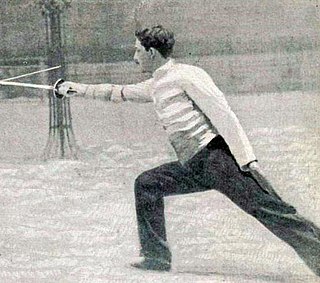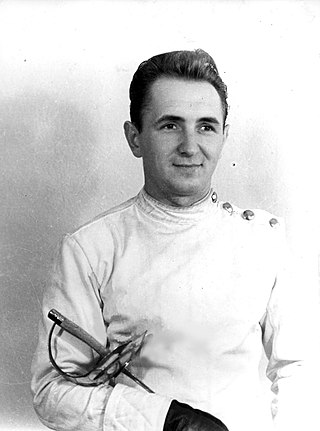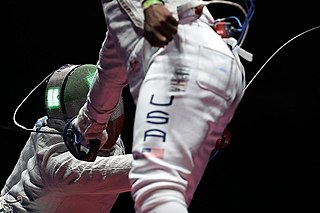
Mariel Leigh Zagunis is an American sabre fencer. She is a two-time Olympic champion in the individual sabre and the first American woman to win a gold medal in fencing at the Olympics. She was Team USA flag bearer in the 2012 Summer Olympics Parade of Nations. She has two Olympic bronze team medals and is a five-time Olympian.

The men's sabre was one of four fencing events on the Fencing at the 1908 Summer Olympics programme. The top two places were won by Hungarian fencers, who also took the gold medal in the team sabre event. Jenő Fuchs took the gold medal and Béla Zulawszky the silver. Bronze went to Bohemian Vilém Goppold von Lobsdorf. There were 76 competitors from 11 nations. Each nation could enter up to 12 fencers.

Ramón Fonst Segundo was a Cuban fencer who competed in the early 20th century. He was one of the greatest world fencers, individual and by team; he was born and died in Havana.

The men's foil was a fencing event held as part of the fencing programme at the 1904 Summer Olympics. It was the third time the event was held at the Olympics. The competition was held on September 7, 1904. Nine fencers from three nations competed. The medals were swept by "Cuban" fencers; only Fonst was actually Cuban, but the other two men were marked as Cuban by the IOC despite being American. The mistake was corrected after more than 100 years in the early 2020s.

The men's épée was a fencing event held as part of the fencing programme at the 1904 Summer Olympics. It was the second time the event was held at the Olympics. 5 fencers from 3 nations competed. The competition was held on September 7, 1904. The event was won by Ramón Fonst of Cuba, repeating as Olympic champion in the individual épée. The silver medal went to Charles Tatham and the bronze to Albertson Van Zo Post. Tatham and Van Zo Post were both Americans, but the International Olympic Committee's results page showed them as Cuban for more than a century until it was finally corrected in the early 2020s.
The men's singlestick was an event held as part of the fencing programme at the 1904 Summer Olympics. It was the only time the event was held at the Olympics. Three fencers competed. The competition was held on Thursday, September 8, 1904. Van Zo Post was credited as Cuban in the IOC's database despite the fact that he was an American, this was corrected in 2021.

The men's foil was a fencing event held as part of the Fencing at the 1912 Summer Olympics programme. It was the fourth appearance of the event, which had not been contested in 1908. There were 94 competitors from 15 nations, a large increase from the 9 fencers who had competed in 1904. The event was won by Nedo Nadi of Italy, the first of his two victories in the event. His countryman Pietro Speciale took silver, while Richard Verderber of Austria took bronze.

The men's épée was a fencing event held as part of the Fencing at the 1912 Summer Olympics programme. It was the fourth appearance of the event, which had been introduced in 1900. The competition was held from 11 to 13 July at the Östermalm Athletic Grounds. There were 93 competitors from 15 nations. Each nation could enter up to 12 fencers. The event was won by Paul Anspach of Belgium. His countryman Philippe le Hardy took bronze. Silver went to Denmark's Ivan Joseph Martin Osiier, the only medal won by the perennial Olympian who competed in seven Games over 40 years. The medals were the first in the men's épée for both nations.

The men's sabre was a fencing event held as part of the Fencing at the 1912 Summer Olympics programme. It was the fifth appearance of the event.

The men's sabre was a competition in fencing at the 2004 Summer Olympics in Athens. A total of 39 men from 21 nations competed in this event. Nations had been limited to three fencers each since 1928. Competition took place in the Fencing Hall at the Helliniko Olympic Complex on August 14. The event was won by Aldo Montano of Italy, the nation's first victory in the men's sabre since 1920. Montano accomplished what his grandfather and father, both world champions in the individual event and Olympic medalists in the team competition, had not been able to: Olympic gold in the individual event. Zsolt Nemcsik of Hungary took silver while Vladislav Tretiak earned Ukraine's first medal in the event with his bronze. France's five-Games medal streak ended.

The amateurs-masters épée was an event at the 1900 Summer Olympics. It was held on 15 June at the Tuileries Garden. There were 8 competitors from two nations. The event was won by Albert Ayat of France. Ramón Fonst of Cuba took silver, while Léon Sée of France earned bronze.

The professional sabre competition at the 1900 Summer Olympics involved 27 fencers from 7 nations. It was held from 23 to 27 June at the Tuileries Garden. The event was won by Antonio Conte of Italy, with that nation also receiving second place with Italo Santelli. Austria's Milan Neralić finished third.

Albertson Van Zo Post was an American fencer and writer. He earned two gold medals in the 1904 Summer Olympics as well as a silver and two bronze medals, and also competed in the 1912 Summer Olympics.

The men's sabre was one of eight fencing events on the fencing at the 1968 Summer Olympics programme. It was the sixteenth appearance of the event. The competition was held from 16 to 17 October 1968. 40 fencers from 16 nations competed. Nations had been limited to three fencers each since 1928. The event was won by Jerzy Pawłowski of Poland, breaking a nine-Games string of Hungarian victories in the event. Hungary's best result in the event was Tibor Pézsa's bronze; Pézsa beat Pawłowski in the final pool but the Hungarian lost two other bouts while the Pole was otherwise flawless. Mark Rakita of the Soviet Union lost only to Pawłowski in the final pool, forcing another bout to break the tie between them for gold and silver; that barrage bout was decided by a single point as Pawłowski beat Rakita 5–4.

The men's sabre was one of eight fencing events on the fencing at the 1980 Summer Olympics programme. It was the nineteenth appearance of the event. The competition was held from 24 to 25 July 1980. 30 fencers from 12 nations competed. Nations had been limited to three fencers each since 1928. The event was won by defending champion Viktor Krovopuskov of the Soviet Union, the nation's third consecutive victory in the event. Krovopuskov was the third man to successfully defend a sabre title and the 10th man to win two medals of any color in the event. His teammate Mikhail Burtsev took silver. Imre Gedővári's bronze medal returned Hungary to the podium after a one-Games absence broke an eleven-Games streak.

The men's épée was one of ten fencing events on the fencing at the 2000 Summer Olympics programme. It was the twenty-third appearance of the event. The competition was held on 16 September 2000. 42 fencers from 22 nations competed. Each nation was limited to three fencers. The event was won by Pavel Kolobkov of Russia, the nation's second consecutive victory in the men's individual épée. Russia joined a five-way tie for third-most gold medals in the event at two. Kolobkov, who had a silver medal in 1992 representing the Unified Team, was the 11th man to win multiple medals in the event. France's Hugues Obry took silver in Sydney, returning France to the podium after a one-Games absence snapped a four-Games medal streak. Lee Sang-ki earned South Korea's first medal in the event with his bronze.

The men's épée was one of ten fencing events on the fencing at the 1996 Summer Olympics programme. It was the twenty-second appearance of the event. The competition was held on 20 July 1996. 45 fencers from 21 nations competed, a sharply reduced number from prior Games which generally had 60 to 80 fencers. Each nation remained limited to 3 fencers in the event. The event was won by Aleksandr Beketov of Russia, the nation's first victory and first medal in the event in its debut. Iván Trevejo's silver was Cuba's first medal in the event since Ramón Fonst won the first two gold medals in 1900 and 1904. The bronze went to Géza Imre of Hungary, that nation's first medal in the men's individual épée since 1980. France's four-Games podium streak ended.

The men's sabre was one of ten fencing events on the fencing at the 1996 Summer Olympics programme. It was the twenty-third appearance of the event. The competition was held on July 21, 1996. 43 fencers from 20 nations competed. Nations had been limited to three fencers each since 1928. The event was won by Stanislav Pozdnyakov, prevailing over silver medalist Sergey Sharikov in an all-Russia final. The medals were the first for Russia as an independent nation, separate from the Soviet Union, in the men's sabre. Damien Touya of France won the bronze medal bout, extending France's podium streak to four Games.

The men's sabre was one of ten fencing events on the fencing at the 2000 Summer Olympics programme. It was the twenty-fourth appearance of the event. The competition was held on 21 September 2000. 39 fencers from 20 nations competed. Nations had been limited to three fencers each since 1928. The event was won by Mihai Covaliu of Romania, the nation's first medal in the men's sabre. Mathieu Gourdain's silver extended France's podium streak in the event to five Games. Germany also earned its first medal in the men's sabre, with Wiradech Kothny's bronze.

The men's sabre competition in fencing at the 2016 Summer Olympics in Rio de Janeiro was held on 10 August at the Carioca Arena 3. There were 32 competitors from 25 nations. The event was won by Áron Szilágyi of Hungary, the fourth man to successfully defend an Olympic title in the sabre and 14th to win multiple medals of any color. It was Hungary's 14th gold medal in the event, half of all possible. Daryl Homer earned the United States' first medal in the event since 1984 with his silver, while Kim Jung-hwan took South Korea's first individual men's sabre medal ever with his bronze.

















